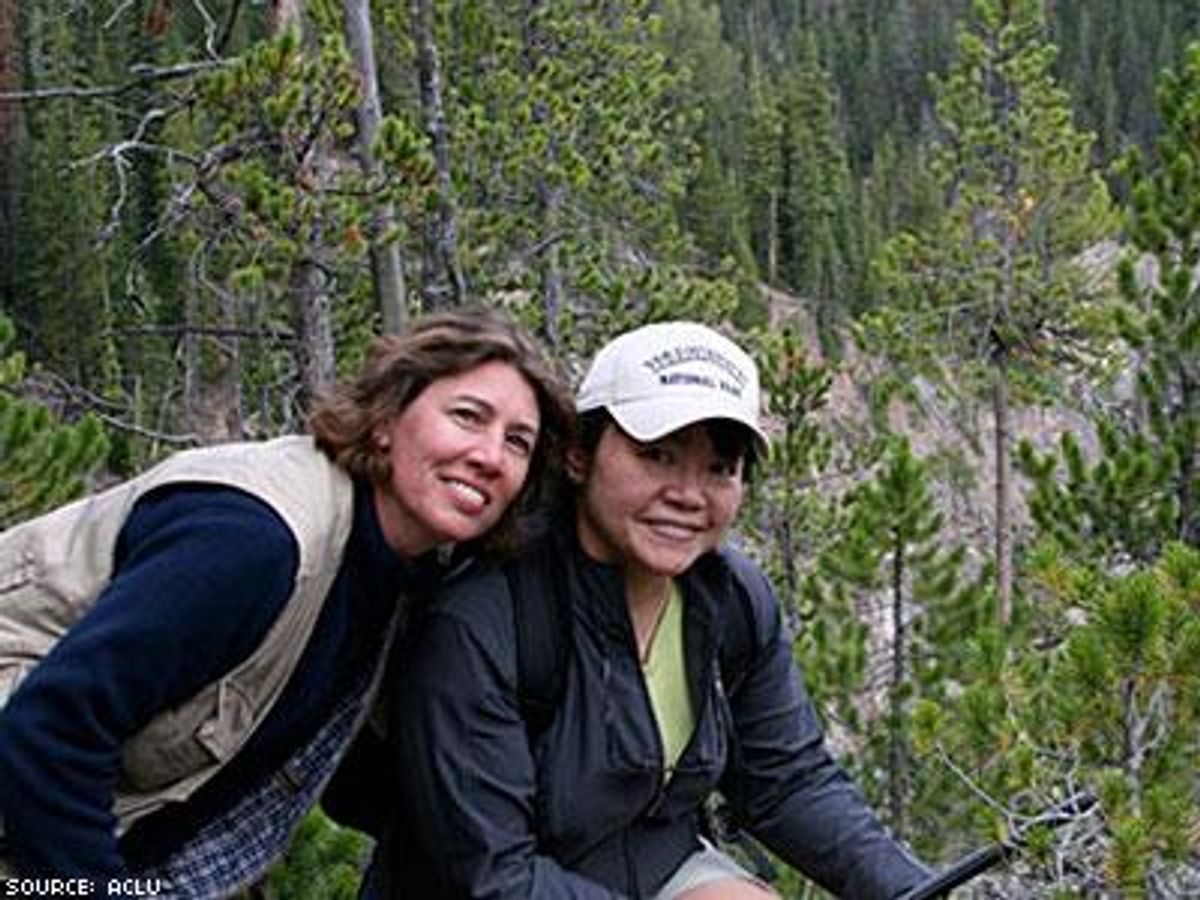
On the road to full marriage equality, same-sex couples also have to fight for their right to grieve.
August 26 2014 3:16 PM EST
November 17 2015 5:28 AM EST
By continuing to use our site, you agree to our Private Policy and Terms of Use.

Life is full of unexpected ups and downs. Sometimes our greatest joys are followed by our deepest sorrows, and through the good times and the bad we turn to our loved ones to guide and comfort us. But for same-sex couples, all too often the best and worst of life's moments become reminders of the second-class status that same-sex relationships are relegated to in many states.
For Midori Fujii and Kris Brittain, the magic of their marriage and wedding was followed by tragedy. In 2008, after 11 years together, Midori and Kris were married in California. Sadly, shortly after they returned to their home in Indiana to continue their life together as spouses, Kris learned that she had ovarian cancer. Through the surgeries, hospitalizations, treatments, and everything else, Midori stood by Kris's side, and they found comfort in each other and their home.
In Kris's final days, she was plagued with worry over what would happen to Midori after her death because they would be treated as legal strangers in their home state of Indiana. The trauma and sadness of being seen as "less than" consumed her as she and Midori prepared to say goodbye. The couple did what they could to protect themselves, drafting wills and other legal documents that would allow Midori to make medical and financial decisions for Kris. But nothing can stand in for the recognition of a marriage.
When Kris died in October 2011, Midori lost the love of her life. And in the most painful moments of grieving, she had to fight to be recognized as a part of Kris's life. At first she was told that she could not authorize Kris's cremation because she was not a spouse. Then, like Edie Windsor, who successfully challenged the constitutionality of the so-called Defense of Marriage Act inUnited States v. Windsor, Midori was saddled with a $300,000 tax bill on the property that she and Kris shared. She would have owed nothing had they been an opposite-sex married couple.
For Midori, the devastation of losing Kris was compounded by the added burden -- both financial and symbolic -- of having their joint home and life treated as the separate lives of two strangers.
The injustice of her experiences following Kris's death motivated Midori to stand up for the dignity she and Kris deserved. In March of this year, Midori, along with five couples and two children, filed suit challenging the constitutionality of Indiana's ban on same-sex marriage and the recognition of such marriages from other jurisdictions. A U.S. district court struck down Indiana's ban in Midori's case and two others. The court proclaimed, "Today, the 'injustice that [we] had not earlier known or understood' ends. ... Because '[a]s the Constitution endures, persons in every generation can invoke its principles in their own search for greater freedom.'"
Those three cases, Midori v. Commissioner of Indiana Dep't of Rev., Baskin v. Bogan, andLee v. Abbott, were consolidated on appeal before the Seventh Circuit Court of Appeals.
Today, the Seventh Circuit heard oral arguments in the three Indiana cases and in the American Civil Liberties Union's case, Wolf v. Walker, challenging Wisconsin's comparable ban. Ken Falk of the ACLU of Indiana and Camilla Taylor of Lambda Legal argued for the plaintiffs in the Indiana cases while James Esseks, director of the ACLU's LGBT & AIDS Project, argued for the plaintiffs in the Wisconsin one.
These are the fourth set of cases to be heard by a federal court of appeals since the Supreme Court's decision in Windsor. There have now been 38 court decisions ruling in favor of marriage equality for same-sex couples. Two other courts of appeals, the 10th Circuit and the Fourth Circuit, have already upheld district court decisions on the side of marriage. Argument was held in the Sixth Circuit earlier this month. We are hopeful that the Seventh Circuit will join the Fourth and the 19th in upholding basic constitutional principles.
One or more of these cases will soon be before the Supreme Court, and we are optimistic that the Supreme Court will also conclude that our Constitution simply does not tolerate the discriminatatory treatment that these marriage bans inflict. As one judge recently concluded in his opinion striking down Oregon's marriage amendment:
I believe that if we can look for a moment past gender and sexuality, we can see in these plaintiffs nothing more or less than our own families. Families who we would expect our Constitution to protect, if not exalt, in equal measure. With discernment we see not shadows lurking in closets or the stereotypes of what was once believed; rather, we see families committed to the common purpose of love, devotion, and service to the greater community.
For Midori, the other plaintiff couples, and same-sex couples and families throughout Indiana and Wisconsin, these cases truly are about love and devotion -- the kind that gives life meaning and transcends death.
CHASE STRANGIO is a staff attorney for the ACLU. This op-ed originally appeared on ACLU.org.
Want more breaking equality news & trending entertainment stories?
Check out our NEW 24/7 streaming service: the Advocate Channel!
Download the Advocate Channel App for your mobile phone and your favorite streaming device!

